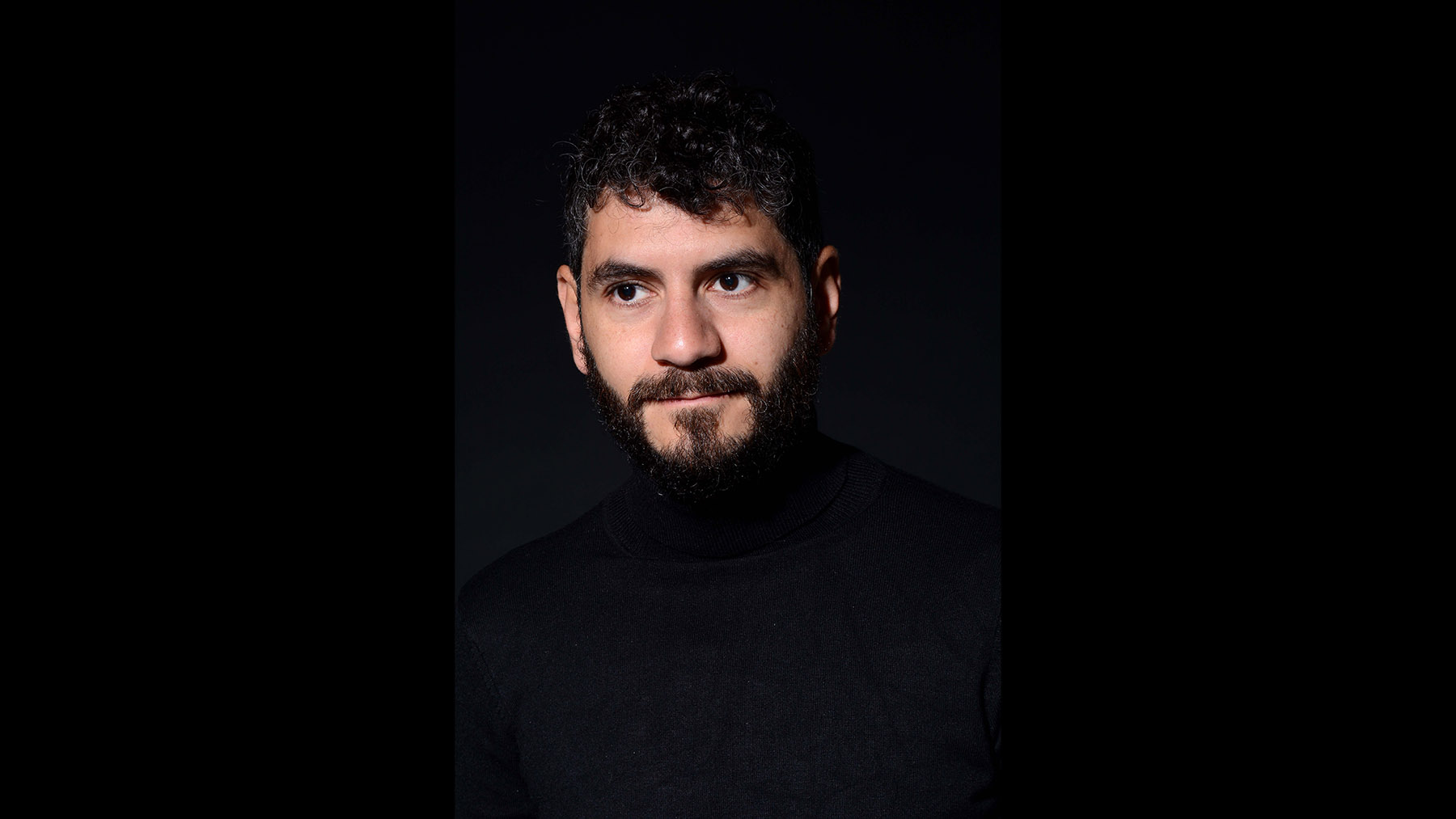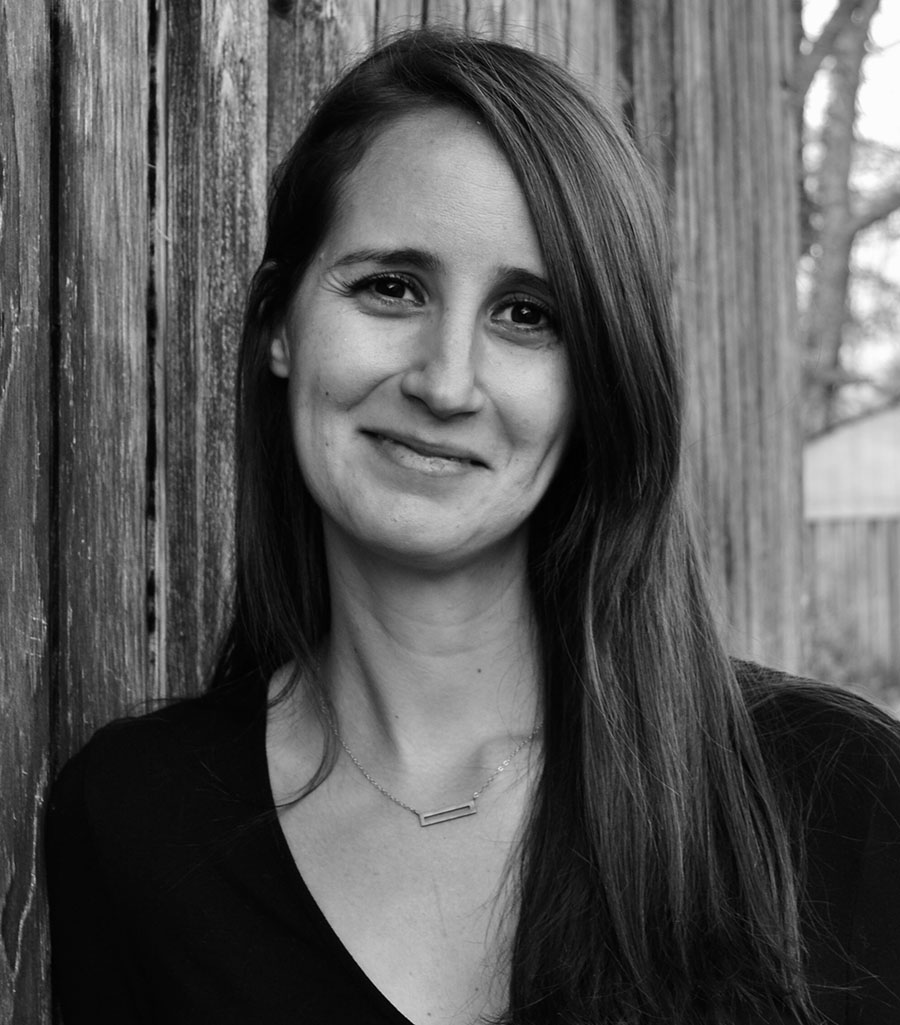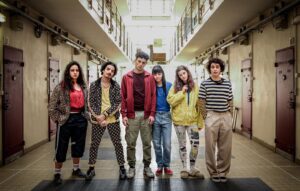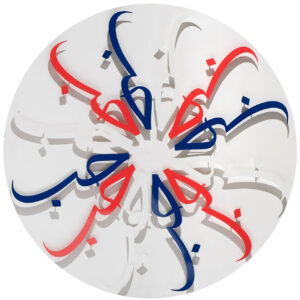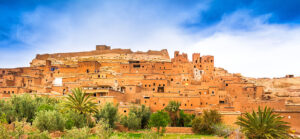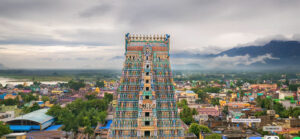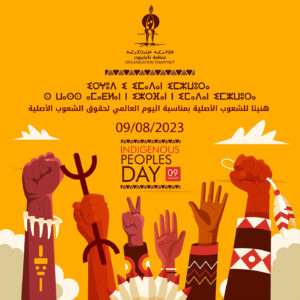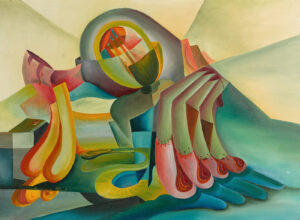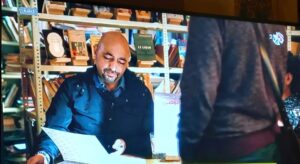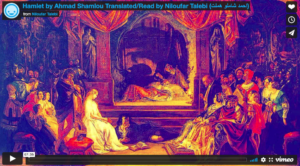For the NATIONALITY issue, shortly before becoming a first-time father, novelist Jadd Hilal spoke with TMR editorial fellow Lara Vergnaud.
Jadd Hilal is a Franco-Lebanese-Palestinian writer based in Paris. He has written three novels, the most recent of which, Le caprice de vivre (The Whims of Life, Elyzad, 2023), explores life’s “Great Questions” — who am I? where do I come from? where am I going? — and specifically, how they apply to persons of Arab origin living in France. This interview was conducted in French, and translated into English by the interviewer.
Lara Vergnaud: Let’s start at the beginning. Where were you born?
Jadd Hilal: I was born in France, in Saint-Julien-en-Genevois, in Haute-Savoie.
TMR: And your parents?
HILAL: My mother was born in a refugee camp in Baalbeck, or near Baalbeck, which in 1948 was the frontier between Lebanon and Palestine. She was born in Palestine. And my father was born in Lebanon in 1953.
TMR: And what kind of passport do you have? What color?
HILAL: I have a Lebanese passport and a French passport. So blue and red.
TMR: You’re a novelist and you’ve written three books. Your first novel was Des ailes au loin, which was inspired by your family history, specifically their experience during the Nakba. [Read an English sample from the novel here.] Followed by Une baignoire dans le désert, which is the story of young boy in a fantastical setting, amid a war. And most recently, Le caprice de vivre, which is a novel about, among other things, the question of identity. What does it mean to be Arab in France? The question strikes me as ridiculous in a way — as in, tell me in 200 words what it means to be Arab. But I’m asking it because I sense that it’s something that can feel quite heavy, for some. That it is a daily experience. And I think that if you’re not living in France, as is the case for most of our readers, even if we are aware of tensions over immigration and identity, it’s difficult to appreciate the extent of the delineations being made.
HILAL: Well, I do think being Arab isn’t easy. It’s a question that always comes up, at one point or another, almost everywhere at the moment, and notably in Western countries. And I find that the particularity, or at least one of the particularities, of France, is that there’s a constant tension for lots of Arabs, which incidentally is often translated through forms of writing, between desire [to identify as Arab] on one hand, and the conditioning to be anonymous on the other, meaning the question doesn’t come up.
And why is that specific to France? Or rather, why is France different from other countries? Because of the “promesse républicaine,” the promise of the Republic. Meaning that on the horizon of this Republic, you find “liberté, égalité, fraternité,” you find anonymity, the absence of color and origin. And that republican contract is one we all grow up with, I think, and believe in for a while, until we realize that actually, things aren’t so simple.
So, you’re being pulled between that and on the other side, precisely the realization that that promise isn’t being kept and that if you look at the facts, societal-wise, we’re not equal. If you’re an Arab in France today, you don’t have the same opportunities as other people. And so, in the absence of that horizon that is quite beautiful, in fact, [the idea] that you don’t have to defend your identity, well, you find yourself adhering to an Arab identity, to a literary or artistic community. That might be a choice. It might become a choice and it might be the only choice.
TMR: All these questions of identity and nationality are completely arbitrary, aren’t they? They are artificial constructs and yet govern our lives. They’re based on geographical borders but also on who’s in power, on which party is in charge. We have the impression these notions are set in stone, but in fact they move. That movement is particularly flagrant and visible when we’re talking about Palestinians. You’re French, Lebanese, and Palestinian. How do you conceptualize all this in the Palestinian context?
HILAL: I have two responses to that. One, which is very specific to Palestine, is to say that I connected with my Palestinian identity from the moment it was truly in peril, when I felt that Palestinian lives were being brushed aside without sufficient political or institutional sensitivity, from Western states and in France, notably. Yet again, as with many identities, we connect with them because they’re under threat.
But I think that more generally, it’s a question broader than Palestine, and which extends to the Arab question, because with Palestine, two things are happening. The first is that a colonized country is being subjected to the omnipotence of an oppressor, which is Israeli, but also American, via a purely colonial relationship. That’s what Trump’s plan is. Claiming to want only good for a people, from the outside, in order to intervene. That is truly the key recipe of colonization as it’s always existed. Educate the masses, bring in schools, [introduce] various methods to implant yourself, and obviously dominate a given territory. Hence why, I think, the Palestinian question concerns lots of countries, namely countries in the Third World, but even in the Arab world, that were subjected to Western colonialism.
I also think that there’s an international question underlying all of this, that isn’t necessarily Arab — actually it’s a Western question, in a certain way — which is the question of justice. In reality, lots of the things happening in the Palestinian situation nowadays can and are calling into question, for the West, the legal precedent of what’s happening. Meaning, doesn’t the situation in Palestine constitute a legal precedent and therefore an international one? Couldn’t Israel’s omnipotence today enable many countries to do the same thing tomorrow? How, for example, could we tell an oppressor country tomorrow that there are laws, that the Geneva Convention exists, when Israel has [flaunted international law]? It’s a Palestinian question, but it’s also an Arab question, a colonial question, and an international question.
TMR: You’re currently writing a novel inspired by your grandmother’s life. How do you think she would have responded if someone had asked her: what’s a nation? what’s a nationality? I thought of my own grandmother as I wrote this question. She never learned how to read, never got to go to school. I think she might have said: Who cares? What matters is family, bread, Allah… What about yours?
HILAL: Well, the novel is inspired by her life, but it is fictional, meaning lots of things in the story don’t exist, or didn’t actually happen. But to answer your question, I think that my grandmother actually would have had an interesting perspective nowadays. Because not everything is a question. There’s also the way we talk about things that matters, the stories we tell, the words we use. When we talk about nations, borders, states, it’s a way of broaching the Palestinian question that is redundant. It doesn’t entirely respond to what is the Palestinian identity. Namely because, refusing a state, a nationality, and only talking about states and nations, in a place where everything has been destroyed, which is being colonized, really prevents [people] from understanding how being Palestinian has meaning within Palestine. Do you see what I mean? If Palestine is only ever the Palestinian state, well, in reality, there’s nothing left of the Palestinian state. Therefore, being Palestinian doesn’t mean anything anymore. And I think that’s precisely where we should shift our perspective.
My grandmother typically wouldn’t talk about borders, or the state, or nations; she would talk about land, in the literal sense. I mean fields, oxen, figs, olive trees, all of that. And I think once you adopt that perspective, you truly understand what’s happening. That it’s catastrophic. Because beyond a given border, that we think is specific, in fact a land is what’s being taken away from people. And the land is all that’s left, when everything else is gone. Meaning, when there’s no longer a state, when people die, it’s the land that remains. You see? Olive trees survive more easily than men, right, and so, when you take that away, well there really isn’t anything left. That is why so many Palestinians, including my grandmother, are attached to the land. For what it symbolizes, in other words a place that can’t be taken away from you, that only belongs to those who work it, in a way.
And also because it’s a means of transmission. Say you die… Your house might disappear. It might get taken by a settler. But your olive tree is your olive tree. It’s there… It remains, somewhere. And even the dead — and I think this is an important question that we don’t bring up often enough — but the dead, they’re buried. And so that’s the final place where transmission persists. You go to the cemetery, you talk to the departed, to people who were in your family. And that is something… if you take that away, well that’s gone too. Ultimately, I think that without transmission, without legacy, then you no longer have an identity. You can’t find it anymore.
TMR: You have been very vocal, especially since October 7, on French media. You recently published an essay with Orient XXI, in which you write about the overwhelming hostility you encountered in that role. “The standard attacks on social media begin in the spring of 2024. At first, I tell myself it won’t get to me, that I’ll rise above. […] Then come the insults, the death threats.” So, very simply, what keeps you going?
HILAL: I think it’s a feeling that’s somewhat contradictory. On one hand, sensing that there is hostility, that the media is making purely deontological errors, meaning that in the actual constitution of information, enormous mistakes are being made. We’re being dazed by the media, in a way, and people don’t know what to think anymore. Though at least, we know there’s a problem now, I think. Then, on the other, there’s the fact that no one is talking. Some Palestinians are tempted to speak up, but not many do. Which is normal, it’s such a stressful situation, so I understand them. And there is definitely a silence in the media that is truly shocking. So it’s complicated. However, I can’t say that there’s injustices being committed and that we don’t hear enough Palestinian voices and then not show up when I’m solicited, even if I know perfectly well that I’m exposing myself by speaking. Though, things have changed a little, very slightly, with lots of moderation.
TMR: You’ve spoken a lot about the silencing of Palestinians. And just now, you said there is a slight change, which as you’ve said is less a moral and ethical correction than it is about making sure you’re on the right side, in case there are consequences to come. But do you think that silencing is reparable?
HILAL: No, I don’t think it’s reparable. Nor do I think it can happen by saying: “We did our job well. It was just that…” Enter the whole spectrum of excuses. There weren’t many Palestinians in France. There weren’t enough “presentable” or French-speaking Palestinians. (Note the part in quotes.) We didn’t have access to the field. Excuses that went on and on. So from that perspective, I tend to think that there’s not much hope on that front. Meaning [the media] didn’t call itself into question, so there was no reason to change, to progress, to accept its mistakes. And when there has been a form of self-questioning, it’s been homeopathic, truly. We mustn’t think that the media, for the majority, are calling themselves into question and that everything is fine, the world is a rainbow. So for me, no, it’s not reparable. It’s just that people are going to get their information elsewhere.
TMR: I have another question I wanted to ask you, but I find myself hesitating. It feels unanswerable, in a way, at least now. I wrote: Is there a future in which Palestine will have the right to exist, or simply, putting aside notions of state and nationhood, the Palestinian people will have the right to exist? But I feel like I’m poking an open wound…
HILAL: No, no… The subject doesn’t hurt as much as it did before, because I’ve grieved a little. And I keep fighting. It’s not a passive grieving, I do what I believe possible, at my level. And I do think there is a true hope of existing elsewhere. In the encounters I’ve had, for example in activist circles, I’ve truly felt that it wasn’t just as a kind of token, i.e., that you’re not just there because they need to have a Palestinian speak and then be able to say, “Good, that’s checked.” [In those circles] there was maybe 1 or 2% Palestinians. All to say that [Palestine] is an issue that truly concerns all.
TMR: You’re Palestinian, you’re French, you’re Lebanese. And isn’t there some Swiss in there? Or did I make that up?
HILAL: Ha, yes, a little.
TMR: So where is home? Where do you feel you belong? That’s quite a hard notion to translate — belonging…
HILAL: I feel like I belong to everything that is inside of me and that I’m unaware of. Because there are the things I am aware of. For example, I know that I belong to France because I was raised here, because I did all my studies here. I know that I also belong to Lebanon, because I’ve spent time there, and part of my family is there. I learned that I belonged to Palestine on October 7. And I think that, specifically, is what’s important. Meaning land, which, unlike a border, doesn’t freeze in one place. You plant a tree and you don’t know where the roots will go. And maybe all of sudden you’ll discover that the root of your tree, somewhere much farther, made something else grow. Like when you plant strawberries, and they spread elsewhere and you don’t know where, and then they just pop up. I think that identity — and this is just how I personally experience it — but I think that this is the healthiest approach, to welcome all the new strata of identity that you can experience. I really like the idea of roots, of a network, because I find that sometimes connections are made between identities, and sometimes, not at all. Sometimes, it’s simple to be French and Arab at the same time. Sometimes, in the span of one or two years, it’s no longer simple at all. Sometimes, you might feel Palestinian and British. And sometimes, not, because you think, “Shoot, England, with Tony Blair, are going to intervene in Palestine.” Know what I mean?
TMR: Absolutely. I want to return to this question of transmission. We all grow up with ideas about our roots, be it land, a country, a religion, etc. What is my family? Where are we from? Ergo, what am I? And for the most part, we’re very proud of these narratives. We’re proud to tell people, in my case, I’m American-Tunisian, but also Algerian on my father’s side, and my mom’s ancestors were Scandinavian… I think most of us feel the need to identify or locate something that is in fact all mixed together, a network of roots, as you said, growing in every direction. Sometimes, we don’t even know certain branches of our family history exist. Hence the importance of transmission, which in turn dictates, or at least influences, our identity. I’d like to end with two questions: What was passed on to you? And what do you hope to pass on?
HILAL: In my mind, it’s the same question! In my case, the things that were passed on to me were, strangely enough, not deliberate. By which I mean that, yes, I had a proper upbringing, which was something I received, but because that’s how I grew up my whole life. So I don’t view it as a transmission. Staying with the land metaphor, I feel like I was watered and I grew. And in that respect, I feel that things were passed down to me but not necessarily intentionally. For example, a simple story. My grandmother telling me such and such story and me thinking, “ah, that’s why I’m like this. That’s why I think this way.” And I think that says something. It says something about Palestine, since we [Palestinians] don’t have [many] buildings, libraries, museums — when you’re in exile, I mean. I’m not aware of any Palestinian libraries [in France]. But one form of transmission is storytelling, which is very present in the Palestinian identity, e.g., parents passing down [stories] to children.
And sometimes with friends, they’ll say, “my parents never told me anything” or “my grandparents never told me anything.” Because, I think, they experienced terrible things. And I understand that. Everyone passes down what they want. But that wasn’t my experience. I always heard anecdotes and stories about Palestine. So that’s what was handed down to me, it’s just that my grandmother never thought: “Hang on, I’m going to tell him this because it’s a means of survival.” It’s something that is so present in Palestinian identity that it happens rather naturally. So that’s what I think I received, moments of life, which is one of the reasons, incidentally, I’m writing Ici, commence la terre [The Land Begins Here]. From the very beginning, I wanted to show the degree to which exile has consequences on a child, on a young child. Which is specific to all exiles. But even if you don’t talk about it, even if you don’t want to pass anything down, you do pass something down. Relationships with a place, land, a garden, with being rooted somewhere. All of that is present.
As for what I’d like to pass down, just myself. Not a certain way of being. Just: I’m like this, I experienced this. Take what you want, leave what you don’t. Are there things that will speak to you more than others? To return to the idea of roots, will certain roots take hold or not?
And so, my daughter, when I talk to her about writing, I’ll tell her, “I write,” but I obviously won’t want her to become a writer. Let’s be honest, there are better ways to make a living! But maybe she won’t care about writing at all. Maybe it won’t appeal to her whatsoever. Or maybe the opposite, she’ll think, “Huh, I see my dad writing. I’m going to try.” So, I wouldn’t mind passing that down, in a reassuring environment. But more than that, I think not.
TMR: In any case, once she’s born, well, you’re not going to control anything. She’s going to do what she wants…
HILAL: Yes, exactly. And I think that’s just as it should be.
Le caprice de vivre is published by Elyzad, 2023
This interview has been edited for clarity and length.



